Nuclear War
by Annie Jacobsen
As always with this topic, by the end I wanted to crawl under the covers and stay in bed.
This is disaster porn with a high likelihood of occurrence. Or at least higher than climate catastrophe or asteroids imho.
This type of book — and probably eventual movie — are needed every couple of years to reminds ourselves of how close to the precipice we walk as a society/humanity. The book is still to fresh in my mind for me to look into what people might hold against it.
I listened to the audiobook, narrated by the author. It’s not particularly a great listen. If they gave the Audiobook and World War Z radio play treatment it’d be even more compelling. Still, it worked for me. Recommended.
The Overstory
by Richard Powers
This book is like exercising a muscle you don’t usually use — awkward at the beginning. Then you get used to it, but it hurts a bit. It’s uncomfortable. Still I kept being drawn to it every night.
It has characters I wouldn’t interact much in the real world, with opinions and beliefs that made roll my eyes. Still, the ones that I would agree with, I liked even less.
However, the main characters in the book, no spoiler, are trees. But not the boring things outside your window, but fantastical Tolkien-like walking magical forests. But here’s the surprise: the tree in your garden, street, park, etc, is magical and fantastical. You don’t need to use your imagination, it’s science.
Highly recommended. The multiple storylines collapsing into one is strange, but it works really well. And the writing is excellent.
Tomorrow, and Tomorrow, and Tomorrow
by Gabrielle Zevin
Beautiful book about friendship and creative collaboration. The context is gaming, but it could be replaced with anything. This is one of those books in which the characters stories are stored alongside real people in my brain. Can’t recommended it enough.
Books of 2022
My reading picked up a bit by the end of the year, but overall it felt like a below-average reading year. At the same time, my reviewing was pathetic. In fact, as I went through the list of books, it became clear that most of the 2021 books still have no review.
Still, wanted to do a rapid check of books. If anything, to remind myself of which books need more detailed notes.
Fiction
- Pachinko
by Min Jin Lee: Great book. There was so much of the Japan/Korean culture which I just had a simplified caricature. Everyday historical fiction at its best. - Salvation
by Peter F. Hamilton: First of a series. Not my favorite book from the author, but will return to the next one. Sci-fi without the pew-pew sounds. - Termination Shock
by Neal Stephenson: I hadn’t clicked with his books in a while, and this reminded me of staying late reading Cryptonomicon, instead of studying in college. Recommended. - Locklands
by Robert Jackson Bennett: Good close to the series. It took the universe in a different direction, but it still was entertaining. - The Dragon Waiting
by John M. Ford: Had never heard of it, and it’s about as old as myself. Very recommended. A cross of genres I don’t think anyone would attempt nowadays. Amazing writing.
Non-fiction
- The Wright Brothers
by David McCullough: Mostly skimmed after their famous flight. But eye-opening account of how innovation is lots of iterations — and not a perfect toolset or infinite resources. - Building a Second Brain
by Tiago Forte: Lots of skimming on this one, but mostly because I’ve consumed this content in every medium other than book — because it didn’t exist yet. Good book if you need to put order in your digital chaos. But I wouldn’t push it on anyone. - Several Short Sentences About Writing
by Verlyn Klinkenborg: While the book has great content, it’s about writing. A master of it, showing you how it’s done. - Build: An Unorthodox Guide to Making Things Worth Making
by Tony Fadell: This is the best business book I’ve read. Mostly because it puts together many concise examples of how to run and grow an organization. Recommended. - Unconditional Parenting: Moving from Rewards and Punishments to Love and Reason
by Alfie Kohn: Painful book if you find yourself on the wrong side of many examples. Important book for me this year. - The Warrior Diet
by Ori Hofmekler: 15 years before interment fasting was a “new” concept of which I went all-in, this book discussed and explained many concepts that took me 5 more years to get to. - How to Live: 27 conflicting answers and one weird conclusion
by Derek Sivers: An uncomfortable little book which makes you think it’s on your side before turning on you, just to make the point that there’s no answer, but you should still work on one. I’ve bought multiple copies of this book and have given it to younger family members.
City of Thieves
by David Benioff
A fun odd-couple adventure set in the nightmarish reality of World War II. As strange as it sounds, this great book is all this and more.
When José recommended the book, he said something along the lines of great writing and amazing character’s relationship. It sounded a bit vague, but his enthusiasm made me add it to the queue. I now understand how it’s a difficult book to describe if you don’t want to spoil it. Coming into the story without know much, made it even more enjoyable.
Be ready to hold-on for a bit — it’s not all laughs, not all darkness. But highly recommended.
The Way I Heard It
by Mike Rowe
Some audiobooks truly benefit from the author’s narration, and this is one of them. On the surface, The Way I Heard It is a selection of episodes of the podcast with the same name. Rowe’s commentary glues the episodes together, and it is done in such a way that it justifies calling this collection a book.
Both in each of stories and in between, I learned, was entertained, and made me think. What else can you ask of a good book?
I think this book will make me revisit my top 10 audiobooks post from a few years back. An easy recommendation.
AudiobookLiftoff
by Eric Berger
Robie grabbed this book from the shelves of B&N and asked me what it was about. I told him I’d start reading it that night and tell him what I learned. So I loved this booked even before reading the first page.
It’s a great book about the SpaceX early days. Enjoyed that it’s not a how they made it, but rather: in now many ways they almost didn’t. My admiration and appreciation of SpaceX and the new space age we’re now only increased after many of the stories.

Thinking in Bets: Making Smarter Decisions When You Don’t Have All the Facts by Annie Duke
Some books influence you, others are thought provoking — this one I gave as christmas gifts last year to my uncle and cousins-in-law. Which is to say, it’s a great book.
I didn’t buy into every single concept, my notes included lots of questions and counter-arguments. Never in exasperation though, but in a healthy debate with the authors voice in my mind.
Although I read this book about three years ago, the following passage has become part of my operating system, and I revisit it weekly:
Decisions are bets on the future, and they aren’t “right” or “wrong” based on whether they turn out well on any particular iteration.
Like the above, other ideas continue to influence me: the difference between listening to a friend vent versus actually expecting advise, the difference between chess and games, using prospective hindsight for better planning. All these and other great nuggets of ideas could justify books of their own.
In this sense, this is the best sort of self-help book. It gives you a story, a set beliefs, evidence to back them up, and then challenges you to come up with a better answer.
It’s also a tight book, not driving a point over and over with different examples. The overall arc of the book does have a driving idea. But some chapters barely touches it before going down a different rabbit hole. Not all of them are as interesting or convincing. But all them make sense, and I don’t recall skimming over any.
I haven’t heard a lot of positive things about Annie Duke’s latest book — but I’m still going to give it a go. Thinking in Bets ROI has been so high that even a total dud would leave her in good standing with me.
 Creative Selection: Inside Apple’s Design Process During the Golden Age of Steve Jobs
Creative Selection: Inside Apple’s Design Process During the Golden Age of Steve Jobs
Creative Selection: Inside Apple’s Design Process During the Golden Age of Steve Jobs by Ken Kocienda
This is probably the best book Apple’s internal workings that I’ve read. It is also a great technical manager book with lots of stories and examples. It shows some of the real friction that exists within a perfect company like Apple — which gives you perspective of problems we all encounter.
My agreeable personality also enjoyed that this is an inside baseball book published with some sort of permission/blessing from Apple. This is not a disgruntled employee complaining and airing out the company’s internal failures. Not that that wouldn’t be a great book — but the good nature of the writing doesn’t get in the way of making me question the reasons behind each statement. I felt safe taking the stories at face value.
I absolutely recommend this book to anyone who likes Apple, the iPhone, and software development in general. Much like Michael Lopp, I hope Kocienda continues to write on these topics. I will be very interested in any other follow up books.

Shorefall (The Founders Trilogy, #2) by Robert Jackson Bennett
Shorefall is a fun continuation of the previous book Foundryside. I absolutely recommend it and I’m ready to read what’s next in the series. It also falls into the distinct category of books that got me out of a fiction slump, all which always have a special place in my heart.
The whole concept of magic as coding is still there, but is not expanded — which is a bit sad. I enjoyed the story and characters, but was a bit disappointed in the end. While the first book was self contained, this one leaves more open threads and doesn’t give the last act as much closure as I was expecting. It’s a trilogy, so this usually happens in book 2.
Still, I absolutely enjoyed the book. It was fast paced, and had a lot of action. Actually, and this is an observation, it had a lot more action than expected, which made me feel that some of it was writing for a movie or TV show. Not a bad thing, especially when done in a fun way as in this case.

5/5
To Be Taught, If Fortunate by Becky Chambers
I read this at the beginning of the pandemic last year. It’s a sci-fi story, but not set up in a soap opera or too distant future. It is not disconnected from our current timeline. Actually it has surprising, but fairly probable realities. The characters have depth and their behavior is believable. And as usual with great sci-fi there’s no bad guy. Exemplefied but my favorite quote of the book:
We should’ve known better, as students of the universe. There’s no escaping entropy.
As 2020 progressed and SpaceX launches continued, the possibility of a space faring future and certainly future. Like this is seems again possible. It’s a book I’ve been whose overall feeling has been in the back of my mind.
I’ll likely start one of Becky Chambers other books soon and can easily recommend To Be Taught, If Fortunate as a great weekend read.

Underground Airlines by Ben H. Winters
This was a powerful read. Racism is both a straight forward and complex subject. A lot of it involves a reality I cannot comprehend because it’s alien to my everyday life. This novel uses the magic of alternate history to peer into that reality.
Story wise it’s a slow burner that eases you into an alternate United States where slavery was never abolished in the south. By the time you’re painted the full picture, shock gives way to sad acceptance how this could have been:
Under the Fugitive Persons Act, those who escape from service are to be captured and returned, anywhere they are found in the United States, slave state or free.
This is an excellent book on its own. But I’ve gone back to that alternate reality a few times over the past month to be a better listener to the recent protests.

Dust (Silo #3) by Hugh Howey
The lack of expectations of the second book and how much I ended up liking it, did a disservice to the final one. A fun but less surprising book. It was a fulfilling end to the trilogy, without all the pieces falling into place — in a way that added realism to the story.
I did miss someone lamenting over the grand plan falling apart in the end. One of the things I enjoyed from the series was the fact there were no evil people, only misguided powerful ones. On this final chapter, the winners and the losers aligned neatly to the good and bad ones.
I’ll look for more books from Hugh Howey, and revisit the world created in my head — because like all good sci-fi, it created an useful parallel universe to be reminded of every so often.

Harry Potter and the Sorcerer’s Stone (Harry Potter, #1) by J.K. Rowling
It’s been 20 years since I read this book and it shows. I did not remember most of it, and what I did was actually from the movie. I’d also forgotten how much of a children book it was, in language and length. The book is surprisingly short! Again, I seem to remember it longer than it was actually was.
Still, it’s a great book. It’s fun to go back to the start of the characters and their world. Reading it as a parent, I really hope Robie and Bettina can discover it on their own terms — unlike Star Wars, which like it or not are influenced by me.

Loserthink: How Untrained Brains Are Ruining America by Scott Adams
I did not enjoy reading this book, but it was a good mental exercise. It kept reminding me of light Jordan Peterson — which is not a bad thing, but not what I expected.
The book has useful pockets of knowledge and anecdotes. But every few pages it can’t seem to avoid reminding that he know better than you , which while probably true, becomes annoying.
Why read it then? because now is an important time to read things that challenge you and makes you uncomfortable. In this sense, it’s worth a read.
However, if you haven’t read How to Fail at Almost Everything and Still Win Big, read that one first. This one suffers from too many as I said on my other book, which doesn’t allow it to stand on its own.

Shift (Silo #2) by Hugh Howey
Amazing sequel. Didn’t know what to expect, which made the surprise even more enjoyable. It’s a continuation of the original story is coherent way — without being a rehash. Managing to give more than simple clues about the origin of the universe created, without ruining the mystery.
Being the second book in a trilogy is always hard because it can sometimes fell like any weak plot point is there as a filler. While this book doesn’t stand on its own (no one said it should) it’s a strong bridge to the last one.

 🏼
🏼
Atomic Habits: An Easy & Proven Way to Build Good Habits & Break Bad Ones by James Clear
Finished this last year, and surprisingly, some of its teachings have stuck. There’s a lot of little gold nuggets on the book, and it’s actually on my reread list, but the most useful concept for me was habit stacking:
One of the best ways to build a new habit is to identify a current habit you already do each day and then stack your new behavior on top. This is called habit stacking.
More than any other lifehack over the past year, this has helped me not waste time on start long a habit without the help of an existing one.
Like many good self-help books, you have to be careful with expectations. Great ones are life changing, but it usually takes a lifetime to measure the change.
I feel this is one of those books: the time invested reading will totally pay out by the small improvements that come from its pages. Even (specially?) if you make a habit of revisiting it.

 🏼
🏼
A Memory Called Empire (Teixcalaan, #1) by Arkady Martine
If sci-fi as a genre was laid out on a table, with page turning galactic battles on one end and space opera’s on the other… then this book would put its feet on the table while rolling its eyes1.
That said, it’s still closer to Asimov’s Foundation than Peter Hamilton, but the point stands: it does things differently than expected — than accepted, in fact.
This should be a boring book. If I tried to explain it at a party, people would be sad for my entertainment low bar2. But just like British drama, you can get away with so much when the characters are good.
And that’s the thing about A Memory Called Empire, I made friends and enemies of the characters, so I was along for the ride. Will absolutely read the next in the series when it’s out.
As recognition this book just won award for best novel.↩︎
As my best man and Robie’s godfather once said: you’re easily amused.↩︎

Wool (Silo #1) by Hugh Howey
I’d started the original Wool book a few times, but it never stuck. Nothing like a quarantine to make a story about living in a silo interesting. Have to say this was a great read. Probably the most page turning book of the year for me — at least the only that made me stay up until 4am at a point.
I enjoyed the characters and story. And the author drops enough clues of what happened to the outside world to satisfy some of my disaster movie genre curiosity. Moved on the next in the series right away.

Foundryside (Founders, #1) by Robert Jackson Bennett
Enjoyed this book from the first page. The world it creates incorporates magic incantations with coding, and the results works perfectly for me. The characters are good, and the story is very well timed. It’s the beginning of a series, and I’ll be back without a doubt.

The Wizard and the Prophet: Two Remarkable Scientists and Their Dueling Visions to Shape Tomorrow’s World by Charles C. Mann
Some books are hard to put down, this one was hard to abandon. It took me most of 2019 to read it, and although it’s long (~600 pages), the slowness was mostly because some of the ideas had to be digested.
The Wizard and the Prophet was a strange book for me. It’s the typical show-off book to causally mention you’re reading, but I struggled with it silently. It’s surprisingly, or even purposely, not an opinionated book. Even though it deals with many of topics I’d argue loudly with my uncle. It’s a extremely factual book, with the only preaching it hints at being: to always look for some unseen impact in all the simplifications that are required to arrive at these facts.
Above all it’s a calming book. It has a soft cadence that would make me read, stop, think, and picture many of the ideas. Lastly at least for me, it’s a humbling book. Many concepts that I attributed to recent fads, or corporate marketing are shown to have origins decades, and even centuries, in the past. It shows people that died not being rich, even though their work has improved my life even more than a smartphone or an app even could.
I can’t recommended it enough. I even bought a copy for my uncle — not to argue, but because I’m curious if given the facts, we can have a more intelligent argument.

The Gods Themselves by Isaac Asimov
It amazes me how Asimov writes about people set in science fiction worlds. His description of sci-fi is so clear, it makes the human drama taking place in it never look out of place.
I had never heard of this novel before my friend Mauricio recommended it last December — and it was a great holiday quick read.
One of Exhalation’s short stories reminded me of it, and I had forgotten how many ideas were causally in it: para-universes, lunar colonies, alien civilization and culture. While it’s a 70’s book, it holds extremely well, with many sensitivities like the role of gender and the cost of clean energy that could have been written today.
If you haven’t read Asimov before, this isn’t the best book to start — it get a bit slow with long dialogs in the middle. But if you like his other books, or hard Sci-Fi; it’s a must read.

Exhalation by Ted Chiang
I’m not usually into short stories, but this science-fiction book was a pleasure to read. On most of them I was hoping they would go on a full book length, that’s how good they were.
While they’re not Three Body Problem level mind blowing, they’re appropriately close for the shorter format — anything more would have felt forced.
Absolutely recommend this book, and I’ll be checking out other from the author.

Children of Ruin (Children of Time, #2) by Adrian Tchaikovsky
This is a self-contained kind of sequel. It helps if you read the first book, but you don’t have to remember any specific details to understand Children of Ruin.
Overall Tchaikovsky continues to provide the most classical sci-fi book feeling I’ve in recent years. The themes are big and he doesn’t shy away ideas that slow things down while they’re described — not explained.
These slow parts mostly pay off, because they are not there to make you study a topic 1, but rather it’s as if Tchaikovsky has more experience than you on the subject, but he’s as baffled as you of how alien the concept is. Which makes perfect sense in a future universe where aliens are present.
While I did stayed up a few nights with Children of Ruin, I enjoyed Children of Time more. However, they’re both excellent and if you liked the first one, this is a worthy read.
Unlike with Neal Stephenson long tangents.↩︎
Books of Winter 2016
Here are the books I read over the past 6 months. As usual, the fiction ones were on Kindle, and the non-fiction as audiobooks.
Fiction
Lucifer’s Hammer by Larry Niven, Jerry Pournelle. |
★ recommended
I was in the mood for a disaster book that dealt with the aftermath, and on that it delivers. The book is from the 70’s, which is fun for the prehistoric tech enviroment, but not so much for some flat (and sexualized) female characters.Killfile by Christopher Farnsworth. |
★ recommended
Fun action-thriller page turner with believable superpower (as in good balance of superpower versus its downside). This is a perfect weekend vacation book.Death’s End (Remembrance of Earth’s Past) by Cixin Liu, Ken Liu |
★ recommended
The final book in The Three-Body Problem trilogy. Among the best Sci-Fi I’ve read. I don’t think it is my favorite of the three, but that’s not saying much given how I love the first two. If you enjoy mind-stretching Sci-Fi, read these books.Dark Matter by Blake Crouch. |
☆ skip it
Great premise, powerful start, but it lost me in the second half. Maybe I was expecting more Sci-Fi, and it ends up being more action thriller. If you like do-over books give it a try, but I just went through the motions in the end.The Grace of Kings (The Dandelion Dynasty) by Ken Liu |
★ recommended
Borderline fantasy — or as much fantasy as Game of Thrones is. This feels more of an early Roman or Japanese empire story set in a fantasy geography. Fun story with very strong characters.The Fifth Season (The Broken Earth Book 1) by N. K. Jemisin. |
★ recommended
Fascinating fantasy world. Actually, the world itself is a character, which in a novel with very strong characters says a lot. I’m likely in for the whole series.The Obelisk Gate (The Broken Earth Book 2) by N. K. Jemisin |
★ recommended
Suffers a bit as a sequel, but still a great read. It advances the story nicely to the next book, which I’ll read for sure.Children of Time by Adrian Tchaikovsky |
★ recommended
A new classic hard Sci-Fi about humans leaving earth for the stars… without much of the usual cliches involved. While never dense, it gets a bit slow sometimes, but it’s for good reasons and you get rewarded for it. Among my favorite books of 2016/2017.Norse Mythology by Neil Gaiman. |
★ recommended
Not my typical fiction book, it’s basically a combination of deeply studied viking folklore stories put together, which makes a somewhat coherent book — as much of folklore does. I read it because I love Gaiman and was somewhat intrigued by the topic. I enjoyed it a lot more than expected.
Non-fiction
How Star Wars Conquered the Universe: The Past, Present, and Future of a Multibillion Dollar Franchise by Chris Taylor |
★ recommended
Rogue One was coming and I wanted a Star Wars fix. It’s a journalist view of the Star Wars property, written by a fan. It worked really well for me, since it steps back and look at the big holes in the universe, without loosing the love for it.A Little History of Philosophy (Little Histories) by Nigel Warburton. |
★ recommended
I thought this was going to be a copycat of A Little History of the World1, but was gladly disappointed. If you struggle like me to put historic characters in context — or in a timeline — this is a great book. Complex concepts are explained as simply as possible, and very dense ones are highlighted enough so you can look for more if interested.
Just realized I didn’t review that book, will add soon.↩︎
Books of Summer 2016
Summers in Miami are fairly long — or at least that’s the excuse I’m using for procrastinating on so many reviews. Rather than wait until next year to catch up with them, here are some quick notes from the books I read/heard from July to October:
Fiction
Grass by Sheri S. Tepper (★★★★☆)
A great example of Sci-Fi as an unobtrusive setting where a story takes place. Some interesting gender roles topics and religious discussions. A denser than normal book that made me think after closing it on many days.Ringworld by Larry Niven (★★★★☆)
Classic Sci-Fi, which while enjoyable seemed a bit banal after reading Grass. Still, a fun ride in an amazing universe. Not sure I’ll come back for the sequels, but I may re-read it at some point.
 Abomination
Abomination
Abomination by Gary Whitta (★★★★★)
Excellent. A page turner, but with a different twist on many fantasy stories. I felt for a few of the characters and will love to return to this world if follow-up books are published.Red Rising (Book 1) by Pierce Brown (★★★☆☆)
If you like The Hunger Games as a genre, then you may really like this. It felt too similar for me, and I found myself struggling to finish it. It did leave me curious with the setup for the next book in the series, so I’ll likely read one more.Steelheart (Book 1) by Brandon Sanderson (★★★★☆)
Not a great story, but a fantastic world. Some cliché conflicts as a result of the its young adult target. I love the rules and restrictions the characters have, so I’ll read the next book for sure.The Fold: A Novel by Peter Clines (★★★☆☆) A solid book with a very intriguing main character in a different setting. This could make a great movie. The story gets weird for the resolution, but it’s a good page-turner.
Changer (Book 1) by Matt Gemmell (★★☆☆☆)
I’m glad most reviewers don’t agree with me. I really wanted to love this book — since I’m a fan of @mattgemmell tech writing, but it was predictable without any strong characters.
Non-Fiction
Essentialism: The Disciplined Pursuit of Less by Greg McKeown (★★★☆☆)
This books has a very important message, but it suffers from booktitis. What could have been a short and to-the-point (essential?) booklet, gets inflated with stories that don’t add much and get repetitive. But if you’re interested in the topic, I’d still recommend it.The Obstacle Is the Way: The Timeless Art of Turning Trials into Triumph by Ryan Holiday (★★★☆☆)
I thought this book could go two directions: either summarizing stoic principles or bring up some insights from stoicism for today’s age. It rather goes somewhere in between, and it didn’t work that well for me. Still, if the topic is new for somebody, I’ll probably consider this book as a good gift.Scrum by Jeff Sutherland, JJ Sutherland. (★★★★☆)
Sprints, backlog, scrum meetings — if you’ve heard any of these words a few times, I recommend this book. You won’t become a scrum master, or have to do exercises, but it’s a great overview of the reasoning behind the scrum process. Even you don’t practice it religiously, it has some good stories.
 Losing the Signal
Losing the Signal
Losing the Signal: The Untold Story Behind the Extraordinary Rise and Spectacular Fall of BlackBerry by Jacquie McNish, Sean Silcoff (★★★★★)
Very surprised how much I enjoyed this book. I thought I knew the RIM story, and how they messed up. But as usual with every topic, the more you dig in, the more you realize the complexity. It’s also a fun reminder of the last 20 years of gadgets.As You Wish: Inconceivable Tales from the Making of The Princess Bride by Cary Elwes, Joe Layden, Rob Reiner (★★★★★)
This is a total feel good book. If you like the Princess Bride movie, and wanted to hear entertaining stories of how it was made, then have fun storming the castle. For even more fun, listen to the audiobook, is narrated by Cary Elwes, so it feels and an audio commentary.
If you’re curious of what I’m currently reading and plan to read, visit my Book List Trello board, which I keep up-to-date.
fiction non-fiction
★★★★★
Seveneves by Neal Stephenson
I stayed late every night this weekend finishing the last third of Seveneves. Although being tired on a Monday is not a great productivity plan, it was worth it.
Neal Stephenson books have been hit and miss for me. I loved Cryptonomicon 1, enjoyed Snow Crash, and have abandoned Quicksilver twice. So his sometimes dense writing is not an instant win with me. I think he may have dialed down in Seveneves, or maybe I was thirsty for some complex sci-fi.
Seveneves is basically three books in one — or more accurately, a trilogy in one book. This is not only in length (it’s 881 pages long) but in structure: you get 3 good sci-fi books that together make a great one. There’s 1) a disaster sci-fi, 2) near-future space sci-fi, and 3) far-future space sci-fi.
As usual with Stephenson, his sci-fi is heavy on the Science. But unlike some of his recent books, you can skim a little if you get bored with the engineering advanced course, and not miss a critical plot point. I was surprised of how few times I took shortcuts on Seveneves — maybe like Cryptonomicon and cryptography, my interest in Seveneves space travel backdrop helped me not loose my attention. YMMV.
If you liked Cryptonomicon and enjoy sci-fi, read Seveneves. It has all the ingredients of classical sci-fi I love: epic story, characters with dimension, open questions that force you to think a bit, and wonders of technology that seem like magic but are explained.
Among the few books I’ve re-read↩︎
★★★★★
Abomination by Gary Whitta
Very surprised how much I enjoyed this book. Unlike Sci-Fi, fantasy is very hit-or-miss with me, but Abomination was a page turner.
I was skeptical about gruesomeness some mentioned on the reviews, but it played its part and didn’t distract from the story.
If you like fantasy and want a fun summer weekend read, you won’t get bored with Abomination by Gary Whitta
fiction fantasy Bossypants (283 pages)
Bossypants (283 pages)
Bossypants by Tina Fey
As expected, this was a fun, quick book. The fact that it’s read by Tina Fey herself gives it an additional conversational tone.
I enjoyed the SNL and 30 Rock insider stories, and I had to bookmark a breastfeeding section to share with Ana. She laughed out laud with it.
Not a life-changing book, but a solid series of stories told by a successful, smart and very smart writer.
Audiobook Non-FictionAurora by Kim Stanley Robinson
Aurora is one of those slow burning Sci-Fi novels that never actually explodes into a plot point, but it doesn’t become boring because of it.
It is a slow story, but it packs enough elements that it’s easy to just sit back and enjoy the ride. It also throws a few philosophical questions up in the air, without anyone in the book having the answer. If you enjoy putting the book down and pondering a bit about what just happened in what you read, you can expect a few of those moments.
In the end the book does have an agenda. It’s a going far away from home to realize what you had all along kind of story. But it doesn’t bend backwards to try to fit the resolution into it.
I did feel some disappointed with the Artificial Intelligence story arc. Without spoiling it, through the book the AI (rightly) becomes one of the main characters. The way this happens is a very interesting technical and psychological twist. However, there’s no epilogue about some of the events that took place. This which doesn’t quite fit into my understanding of the rest of the characters.
You don’t have to run and read this book. But if you enjoyed Red Mars, like deep space travel sci-fi, and have some reading time, it’s not a waste of time.
Sci-Fi★★★★★
We Learn Nothing by Tim Kreider
I heard a chapter of this book in Tim Ferriss website (who’s also a producer), and really enjoyed it. Given the free chapter, I believed book had a more productivity/self-help/improvement angle… and I was pleasantly surprised to be wrong.
Tim Kreider is your cooler hipster friend that you openly judge — and are equally fascinated by — because he can’t enjoy a normal live. And at the same time you secretly envy him, since you’re aware he sees through your normalcy as well.
The book is a series of essays/stories with a minimal thread of relation to each other. Not all of them captured my attention equally — I abandoned the book a few times for a week or so. But it never was about quality of the story, in many cases it was an overload of sincerity that made me cringe because how close it resonated. You might not agree with his opinions and choices, but his ability to share his thoughts and emotions make it imposible not to relate somehow every few pages.
And this is where I enjoyed the book the most. It’s one of the best written books I’ve read. At least it’s the book I’ve said to myself the most times: I wish I’ve written this.
If you enjoy hearing the stories of a friend who’s life is (and has always been) a mess over a few drinks — and concede s/he does make some good points, I highly recommend this book.
non-fiction essays memoir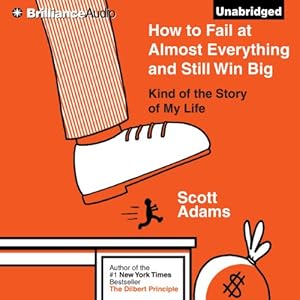
★★★★★
How to Fail at Almost Everything and Still Win Big by Scott Adams
A week after finishing this book, I’m still thinking about some of the chapters. I will listen to it again for sure.
Don’t have goals, have systems, Fail forward, Happiness = health + freedom. Some of the self-help mantras Scott Adams shares on this book make sense in hindsight, but at least for me, the angle was new and refreshing.
However, I wouldn’t recommend this book to everyone. You need to be OK with hearing advice based on lots of anecdotes. On Scott Adams defense, he’s upfront about this and has no problem with the idea that you’re just going to laugh at him through each chapter.
But as I said in the beginning, I’m very likely to listen to it again soon. I cherry picked some of the concepts and I’m planning to put them in practice, and I’m looking forward to calmer reread. Which is about the best recommendation you can give a book I guess.
non-fiction self-help productivity
Recommended ✓
Creativity, Inc. by Ed Catmull
Finally finished listening to Creativity, Inc.: Overcoming the Unseen Forces That Stand in the Way of True Inspiration by Ed Catmull this week.
Took me longer than expected because I kept abandoning it every few days. I’d heard going things about the book, but it wasn’t until Nav recommend that I pushed it up the queue.
I think the book is a bit slow because of how sincere it is. Unlike many other Business/Leadership books which always have some sort of recipe for being as successful as X — Ed Catmull is upfront about how hard having a continuously creative company is.
Sometimes the book felt bittersweet in how removed the problems are from my daily work experience but YMMV. But these cases were more than compensated by relatable and detailed accounts of issues encountered by Pixar and how they addressed them. In some cases even unsuccessfully.
Finally there’s the whole Steve Jobs angle. Listening how Jobs intersected the Pixar story from the point of view of a colleague and (later) a friend, was interesting for the fanboi in me.
I have no problem recommending this book. My only asterisk would be that: it is not a book to find out what you need to do. Rather, it gives the proper mindset to figure out what you should do.
non-fiction managementOn my favorite audiobooks
Top 10 lists are typically linkbait, but my friend Lesley asked me for my recommended list of audiobooks and it seemed like the easiest way to rate my favorite ones:
1. Endurance: Shackleton’s Incredible Voyage by Alfred Lansing
- Narrated by: Simon Prebble
- Length: 10 hrs and 23 mins
Without a doubt my favorite audiobook. The story is so amazing you forget it was an actual event. This is the only audiobook that I’ve been able to listen while jogging — so intense was my attention.
2. Born Standing Up: A Comic’s Life by Steve Martin
- Narrated by: Steve Martin
- Length: 4 hrs and 3 mins
The combination of a great autobiography, with Martin himself reading makes this another a close second. It makes a superficial understanding of that funny actor into a life story told by your favorite uncle.
3. Ghost in the Wires: My Adventures as the World’s Most Wanted Hacker by Kevin Mitnick, William L. Simon
- Narrated by: Ray Porter
- Length: 13 hrs and 59 mins
A catch me if you can story that it’s hard to believe is real. Also an inside tour to the world of computers and networks from the late 70’s to the early 90’s.
4. Masters of Doom: How Two Guys Created an Empire and Transformed Pop Culture by David Kushner
- Narrated by: Wil Wheaton
- Length: 12 hrs and 43 mins
Great example of how a good reader matters in an audiobook. Wheaton is as excited about reading this book as you are listening. If you grew up with PCs and video games in the 90’s, you’ll love this book. If you didn’t, it’s still an amazing story about technology and brilliant characters.
5. Made to Stick by Chip Heath, Dan Heath
- Narrated by: Charles Kahlenberg
- Length: 8 hrs and 37 mins
I listened to this book on my walk to BU 9 years ago. I probably quote more things from it than from any class I took during the MBA.
6. World War Z: An Oral History of the Zombie War by Max Brooks
- Narrated by: Max Brooks, Alan Alda, John Turturro, Rob Reiner
- Length: 6 hrs and 3 mins
Only fiction book I’ve enjoyed. I’m not much of a zombie fan, but the documentary style of this book makes for a very fun ride. I hope they don’t make a movie and ruin it ;).
7. The Master Switch: The Rise and Fall of Information Empires by Tim Wu
- Narrated by: Marc Vietor
- Length: 14 hrs and 10 mins
More than any other book I’ve listened (or even read), Wu’s walkthrough in the history of networks has given me a much deeper understanding and context in an industry I thought I knew. Every geek and policy maker should read this book.
8. Console Wars: Sega, Nintendo, and the Battle That Defined a Generation by Blake J. Harris
- Narrated by: Fred Berman
- Length: 20 hrs and 41 mins
Be ready for flashbacks. If you ever went to bed hoping Santa brought you a Nintendo, Sega Genesis or Sony Playstation — this is the behind the curtain story. Also has some interesting business cases nuggets.
9. I Must Say: My Life as a Humble Comedy Legend by Martin Short
- Narrated by: Martin Short
- Length: 8 hrs and 40 mins
The other guy in the Three Amigos movie. Famous, but not star famous. An extremely sincere book with many relatable stories.
10. A History of the World in 6 Glasses by Tom Standage
- Narrated by: Sean Runnette
- Length: 7 hrs and 38 mins
Fun listen that will make you appreciate your drinks a lot more — and probably become a little annoying at dinners.
audiobook non-fictionReading Along the Way
Before moving to Norway, my pal @FedericoA gave me a book called Out Stealing Horses, by Per Petterson. Although hardly my style of novel, it was surprisingly enlightening in helping me grok aspects of norwegians that I would most likely have missed otherwise.
Since then I have always tried to read something about places I’m visiting. While I’d love for this to be an intellectual exercise, I have realized that if the book is not entertaining in some way, I never finish it. As as result most of the books are historical fictions or plain novels, but they usually still reach their objective: giving me a different perspective of the place before/during my visit.
Below the books that fit this description that I read on my recent trip, a passage I highlighted, and some minor notes:
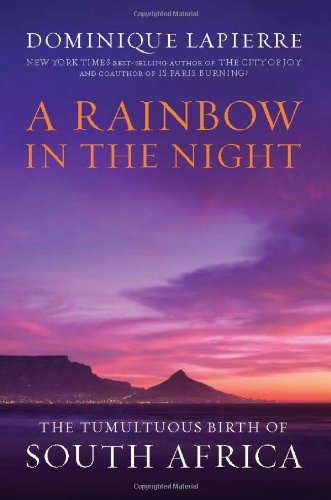 rainbow in the night
rainbow in the night
A Rainbow in the Night: The Tumultuous Birth of South Africa by Dominique Lapierre
As is often the case in Africa, the confrontation turned into a joyous celebration.
The apartheid and the history of South Africa (all Africa for that matter), have always been nebulous concepts for me. I enjoyed this book immensely. If more history books were written like it, the world would be a more understanding place. Without picking sides, you get an interesting overview of the history of the country, with special attention to important events.
Visiting museums and landmarks during my stay was more enjoyable thanks to this book.
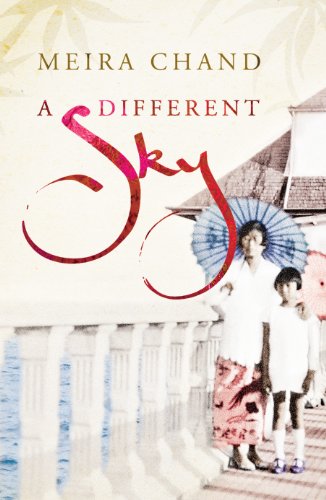 A Different Sky
A Different Sky
A Different Sky by Meira Chand
The day’s experiences settled uncomfortably in Mei Lan like an over-rich meal.
In itself, not a great book. However, it does manage to give a good introduction to the history of Singapore by mixing three characters from different backgrounds through its time as a British colony, WWII and ending up with independence.
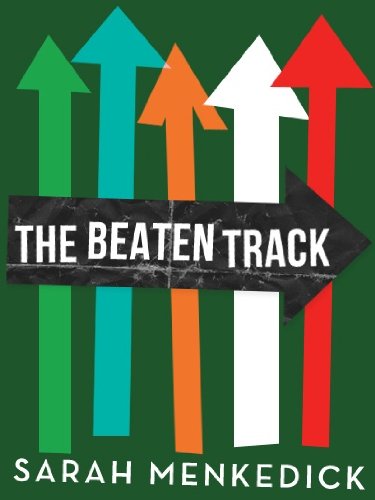 The Beaten Track
The Beaten Track
The Beaten Track by Sarah Menkedick
Slow travel operates largely on the gimmick of time just as backpacker travel operates largely on the gimmick of authenticity.
Not so much a book rather combination of very long articles, but still interesting. I would recommend this book to anyone wanting to get into travel mode. If you’re scared about arriving into a city without a hostel reservation, or not being able to understand what the food is, these real stories of will remind you it could be so much worse.
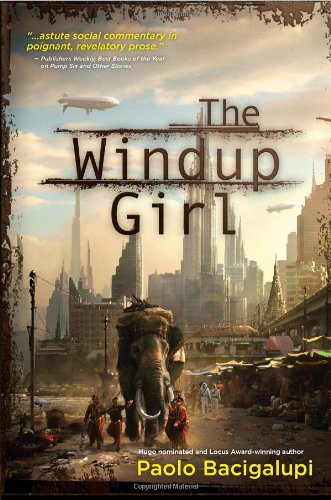 The Windup Girl
The Windup Girl
The Windup Girl by Paolo Bacigalupi
His last days were not his only days.
Sadly I didn’t get to visit the Kingdom of Thailand because of the rains, but this Sci-Fi novel was still worth it by itself. It would probably have not helped much in recognizing the country, but the proudness of the people seems to be accurately represented from what other travellers told me.
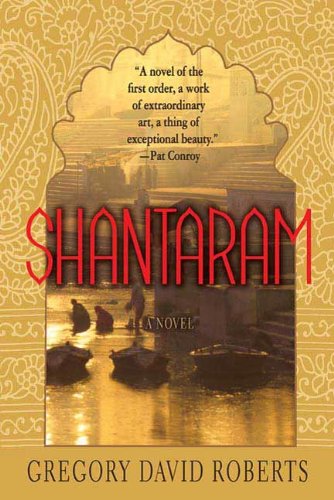 Shantaram
Shantaram
Shantaram by Gregory David Roberts
Civilisation, after all, is defined by what we forbid, more than what we permit.
I read this a few years ago and loved it. While I really don’t believe it’s based on a true story, it does capture the essence of India’s personality. When rereading I remembered something from the first time: the book is divided in 5 parts, forget the last one, ruins the whole experience.
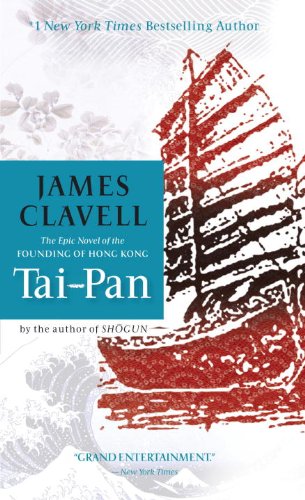 Tai-Pan
Tai-Pan
Tai-Pan by James Clavell
Empires are built by young men, Culum. They’re lost by old men.
Excellent book. The historical aspects are true enough that you can walk around Hong Kong and know a little of everything. The fictional characters are so great, you also put an extra effort trying to understand how it really happened.
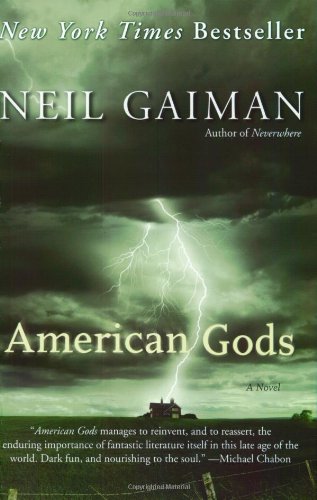 American Gods
American Gods
American Gods by Neil Gaiman
There was a girl, and her uncle sold her, wrote Mr. Ibis in his perfect copperplate handwriting. That is the tale; the rest is detail.
Since I’ve been traveling to the US for most of my life, reading this book to get a different perspective seemed ridiculous. Was I wrong. There is something very weird about this book that helps you understand the US a little better. And even if you don’t care about that, reading it was still one of the most enjoyable experience with words I’ve ever had.
travel fiction non-fiction